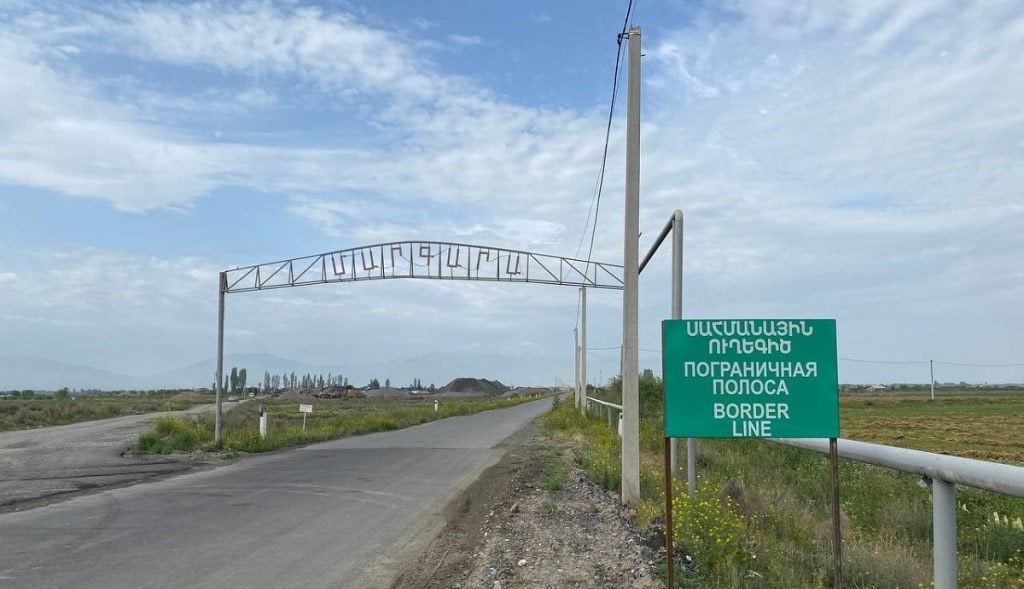The new normalization phase in Armenian-Turkish relations commenced at the end of 2021, marked by both countries’ announcements of their readiness to take steps in that direction.
Two telephone conversations took place during this month. On June 18, Armenian Prime Minister Nikol Pashinyan spoke with Turkish President Recep Tayyip Erdogan, and today, June 25, Foreign Minister Ararat Mirzoyan spoke with his Turkish counterpart.
The fact-checking team at Media.am, “Verified,” reported that even though there have been high-level contacts between Armenia and Turkey, there have been no tangible changes in the relations between the two countries at this stage. The renovated “Margara” checkpoint remains closed.
In one of our previous publications, we highlighted that despite numerous meetings between high-ranking officials and seemingly objective agreements reached during the Armenia-Turkey negotiations since independence, these have not guaranteed settled relations.
The “new” Armenian-Turkish relations
The new phase of normalization of Armenia-Turkey relations began in 2021. The goal of normalizing Armenian-Turkish relations was included in the 2021-2026 program of the Pashinyan-led government, in the section dedicated to foreign policy.
The statement emphasized that Armenia is willing to resolve relations with Turkey without any preconditions.
“Even today, the Republic of Armenia is prepared to make efforts to normalize relations with Turkey. Moving forward without preconditions, the parties should cooperate to create an atmosphere of mutual trust to establish normal relations gradually,” states the government’s plan.
During the government session on August 27, Pashinyan announced that “there are certain positive signals from Turkey.”
“We will assess those signals and react positively to the positive ones,” he said.
Two days later, the Turkish president announced that the region needs a constructive approach. “Even if there are differences, the development of neighborly relations should be based on respect for territorial integrity and sovereignty. That is why we can gradually improve relations with Armenia. The new government has announced its readiness to move in that direction,” Erdogan said, linking the possible cooperation with the establishment of peace with Azerbaijan.
In December 2021, Ruben Rubinyan, the deputy of the National Assembly, was appointed as Armenia’s special representative for the negotiations regarding the settlement of Armenian-Turkish relations. Similarly, Turkey appointed Serdar Kılıç, the former ambassador of Turkey to the United States.
The envoys met four times, with the last meeting taking place on July 1, 2022. During this final meeting, the parties agreed to allow citizens of third countries visiting Armenia and Turkey to cross the Armenia-Turkey land border in a shorter period of time. Additionally, they discussed initiating direct air cargo transportation between Armenia and Turkey.
In December 2021, Armenian Fly One Armenia, and in January 2022, Turkish Pegasus Airlines acquired the right to operate Yerevan-Istanbul-Yerevan flights. As a result, direct air transportation between the two countries was restored.
In February 2023, following a powerful earthquake in Turkey and Syria, 27 search and rescue team members from the Armenian government’s rescue service were deployed to Turkey to assist in the aftermath of the earthquake.
On February 11 and 15, five Armenian trucks loaded with humanitarian aid crossed the Margara-Alijan (Igdir) checkpoint of the Armenia-Turkey land border, which had been closed since 1993.
On February 15, the Foreign Ministers of Armenia and Turkey met in Ankara, where Mirzoyan reiterated Armenia’s commitment to seeking peace in the region.
Cavusoglu, on the other hand, expressed gratitude for the assistance and emphasized that long-term peace in the South Caucasus can be achieved with genuine efforts from Armenia, Turkey, and Azerbaijan.
In January 2024, the Armenian side announced that the Margara checkpoint on the border with Turkey had been fully renovated and was ready for operation. However, despite this announcement, the checkpoint remains closed to this day.
“On the Armenian side, we have completed all infrastructure works and the checkpoint is ready for operation. On the Turkish side, we have not seen any progress towards implementing this agreement, but we hope steps will be taken,” stated Ruben Rubinyan on June 11.
Armenian-Turkish ties intertwined with Armenian-Azerbaijani relations
The ongoing conflict between Azerbaijan and Armenia remains a complicating point in the efforts to improve Armenian-Turkish relations. During the first Karabakh war, Turkey chose to close its land and air borders with Armenia.
During most of the armed clashes since the 44-day war, whether in Armenia or Nagorno-Karabakh, Turkish diplomats have expressed their unwavering support for Baku.
After Azerbaijan attacked Armenia in 2022, Mevlut Cavusoglu announced that Turkey would never leave Azerbaijan’s side. He emphasized that Ankara’s relations with Armenia are not independent of Yerevan-Baku relations. In November 2022, Erdogan noted that the settlement of Armenian-Turkish relations depends on the settlement of Armenian-Azerbaijani relations.
He expressed his support for Azerbaijan in Nagorno Karabakh in 2023 regarding the establishment of final control as a result of the armed operation in September.
During those days, Turkey emphasized, “We believe that ensuring the continuity of the comprehensive negotiation process between Azerbaijan and Armenia is the only way to establish peace, security, prosperity, and permanent stability in the region.”
Turkey is in favor of the “Zangezur Corridor” proposed by Azerbaijan, but this idea is a major concern for the leadership of Armenia. The President of Turkey has stated that the corridor holds significant strategic importance for both Baku and Ankara and should be realized.
On the other hand, senior officials in Armenia maintain their position that they support the normalization of relations without any preconditions.
The Armenian genocide
In the 2018 program, Nikol Pashinyan’s government committed to ensuring the continuity of the Armenian Genocide recognition process. By 2021, the government’s program has made it clear that the recognition of the Armenian Genocide by the USA has fundamentally altered the landscape of international recognition. The government’s plan states that the international recognition of the genocide will not only serve to prevent an escalation of regional tensions but instead work towards de-escalating the situation in the region.
In his statement on April 24, 2024, Nikol Pashinyan emphasized, “Never again. We should not say this to others, but to ourselves. And this is not an accusation against us at all, but a point of view where we, only we, are responsible and the director of our destiny and we are obliged to have enough mind, will, depth and knowledge to carry that responsibility in the domain of our sovereign decisions and perceptions.”
Erdogan mentioned on April 23, “A new order is now being established in the region. It’s time to let go of unfounded memories and act based on present realities.” He also emphasized that Nikol Pashinyan understands this.
Nikol Pashinyan – Erdogan
The current leaders of Armenia and Turkey have had telephone conversations five times since Nikol Pashinyan assumed the post of Prime Minister.
The first occurred on July 11, 2022, months after the start of the Armenian-Turkish settlement process. In 2023, the leaders had three more telephone conversations.
During those five phone conversations, Pashinyan and Erdogan congratulated each other on national holidays, discussed cooperation, opening the border for third-country nationals, and other similar issues.
The leaders met in person once in 2022, in Prague.
“The Prime Minister’s office emphasized the need to implement the agreements reached during the discussions between the special representatives of the two countries as soon as possible. This includes the opening of the land border for citizens of third countries and the establishment of direct air cargo transportation between Armenia and Turkey.”
Additionally, in June 2023, Nikol Pashinyan attended the inauguration ceremony of Recep Tayyip Erdogan in Ankara.
The Foreign Misters of Armenia and Turkey
Ararat Mirzoyan has met with Turkish colleagues four times, three of which happened in Turkey.
In 2022, at the Turkish side’s invitation, the Armenian chief diplomat participated in the Antalya Diplomatic Forum from March 10 to 12, during which he met his Turkish counterpart, Mevlut Cavusoglu. Their second meeting took place on February 15, 2023, after a devastating earthquake in Turkey and Syria.
On October 23, 2023, Mirzoyan and the newly appointed Turkish Minister of Foreign Affairs, Hakan Fidani, met in Tehran as part of the regional consultation platform meeting (3+3).
In March 2024, Fidan and Mirzoyan had their last meeting, during which they discussed the process of normalizing relations between Armenia and Turkey and reaffirmed their willingness to achieve full normalization of relations.
Mirzoyan and Fidan also had three telephone conversations, with the last one taking place on June 25, 2024. During this call, the foreign ministers once again discussed issues related to the ongoing dialogue between the two countries, as well as regional developments.







